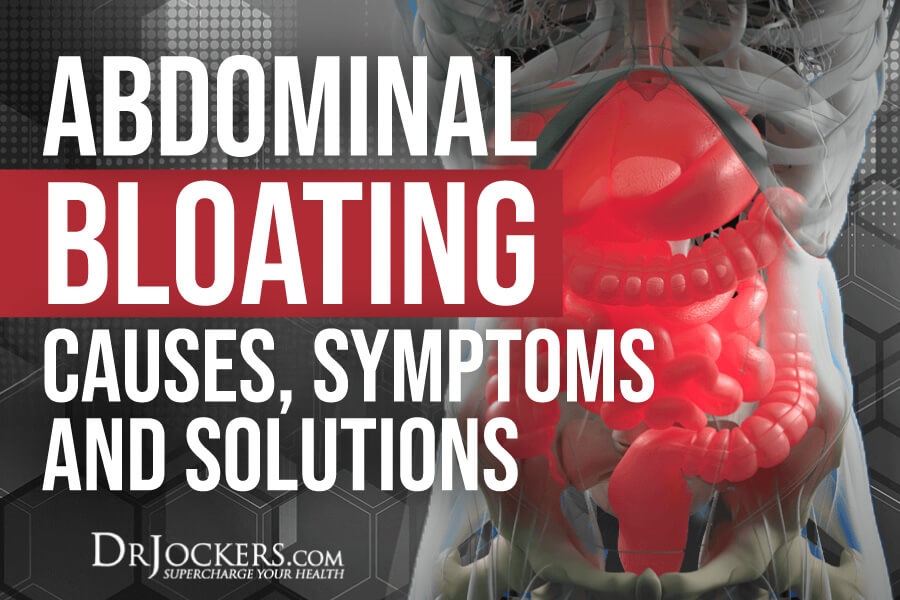 Abdominal Bloating: Causes, Symptoms & Solutions
Abdominal Bloating: Causes, Symptoms & Solutions
I don’t have to introduce you to abdominal bloating. You know the feeling of a swollen, full, and tight abdomen after meals. Millions of Americans experience abdominal bloating on a regular basis. It doesn’t have to be this way though. There are some simple natural solutions for abdominal bloating you can try to improve your health.
In this article, you will learn what abdominal bloating is and understand its major causes. I will explain what functional digestive health testing strategies you can try to identify the cause of your abdominal bloating. I will offer some natural bloating solutions to regain your health and vitality.
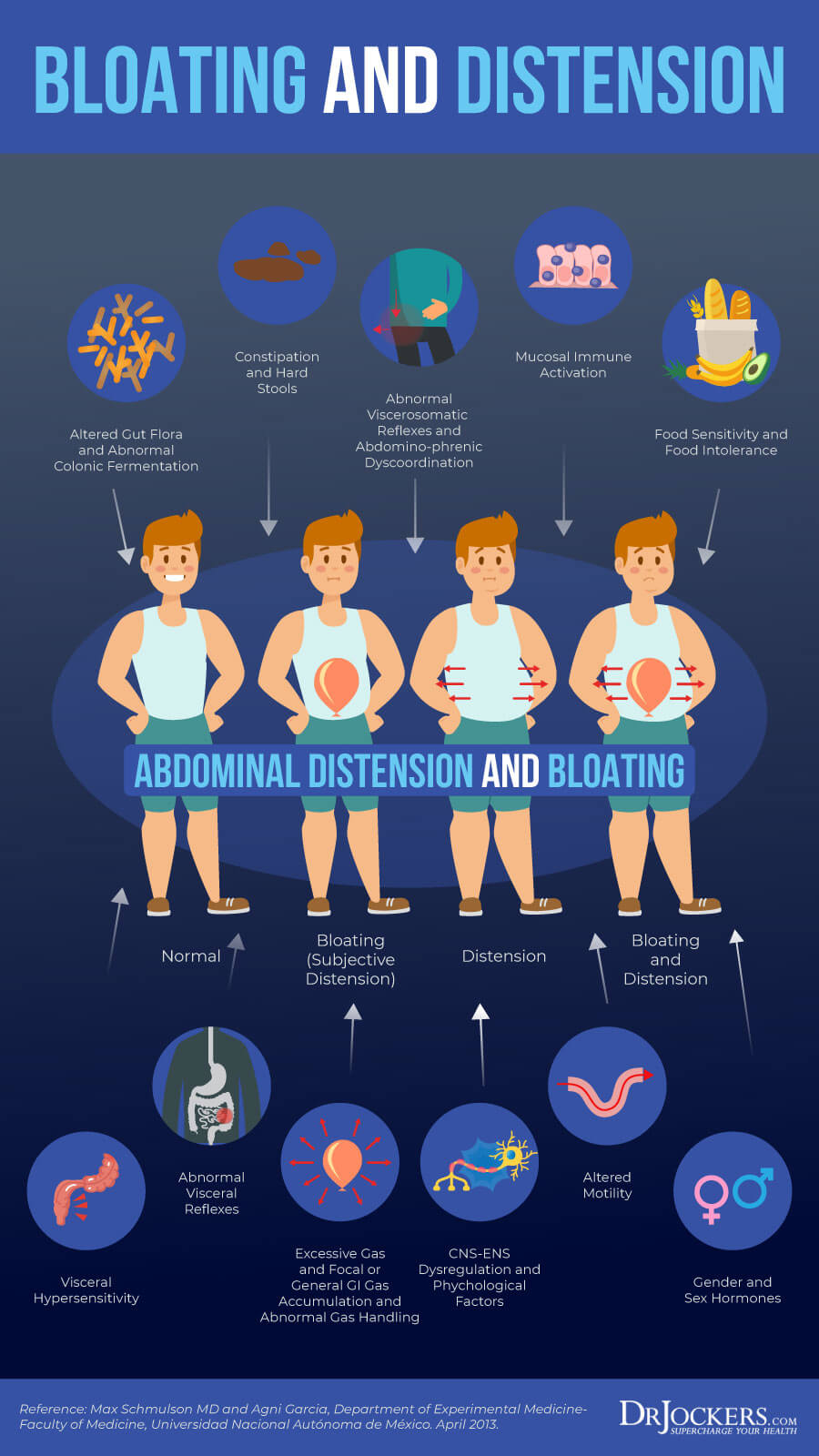
What Is Abdominal Bloating?
Chances are, I don’t have to explain abdominal bloating. We all know the feeling of a full, tight, or swollen abdomen. Some may describe it as carrying a food baby that’s causing discomfort even many hours after eating. Abdominal bloating happens when your gastrointestinal (GI) tract) gets filled with gas or air causing it to become distended, swollen, painful, and tight.
When you have abdominal bloating you may also experience excessive gas, burping, belching, pain, rumbling in your stomach, or constipation. While most people experience abdominal bloating every once in a while, many people experience it on a regular or daily basis. Abdominal bloating can get very uncomfortable and may interfere with your recreational, social, and professional activities (1).
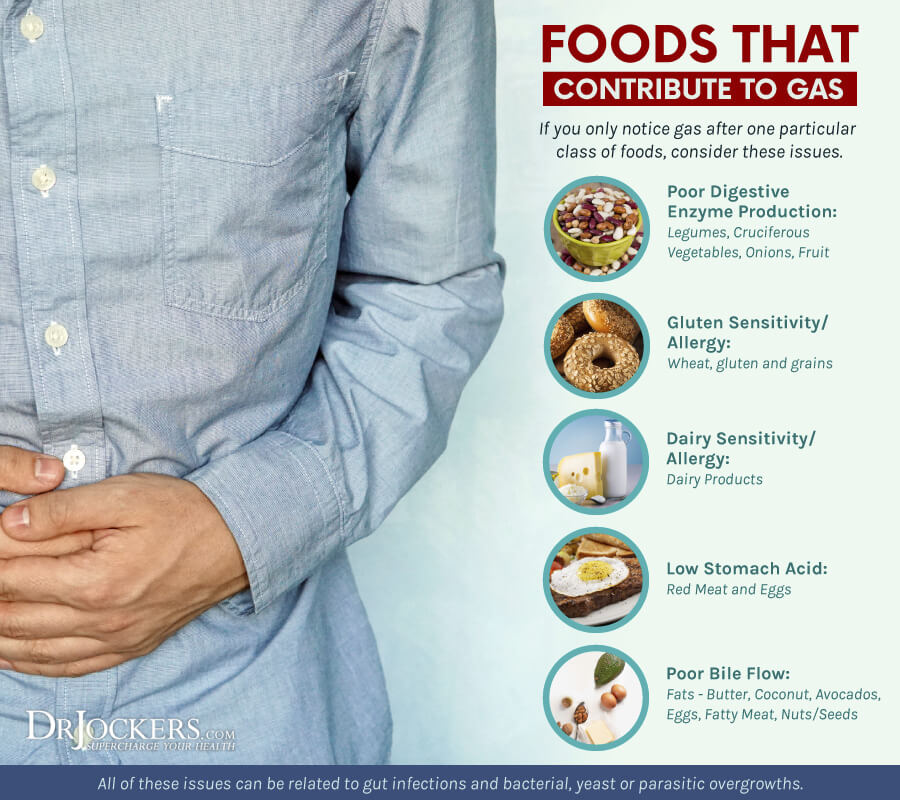
Major Causes of Abdominal Bloating
Knowing the major causes of abdominal bloating is critical for making dietary and lifestyle shifts that reduce or eliminate this uncomfortable experience. There are a variety of reasons you may experience abdominal bloating on a regular basis.
These causes are a result of unhealthy dietary habits, overgrowth of pathogens in your gut, and other gut health issues. Let’s look at the major causes of abdominal pain.

Food Sensitivities
Food sensitivities are not the same as food allergies and more often go unnoticed. Food allergies, just like other allergies, cause immediate reactions in your body. You may experience hives, puffiness, difficulty breathing, or other symptoms right after eating a certain food. Food sensitivities on the other hand are usually more subtle. The reaction may not be as drastic and may occur hours or days after eating a certain food.
If you are experiencing abdominal bloating due to food sensitivities, you will likely notice a bloated stomach an hour or a few hours after your meals instead of immediately. If you are consuming a certain food that you are sensitive to on a regular basis, you may experience bloating daily even before meals.
The most common food sensitivities include gluten, dairy, eggs, soy, sugar, corn, and nuts. However, it may be possible that your body is sensitive to something less common than most people wouldn’t react to. To learn more about food sensitivities and how to identify them, I recommend this article.
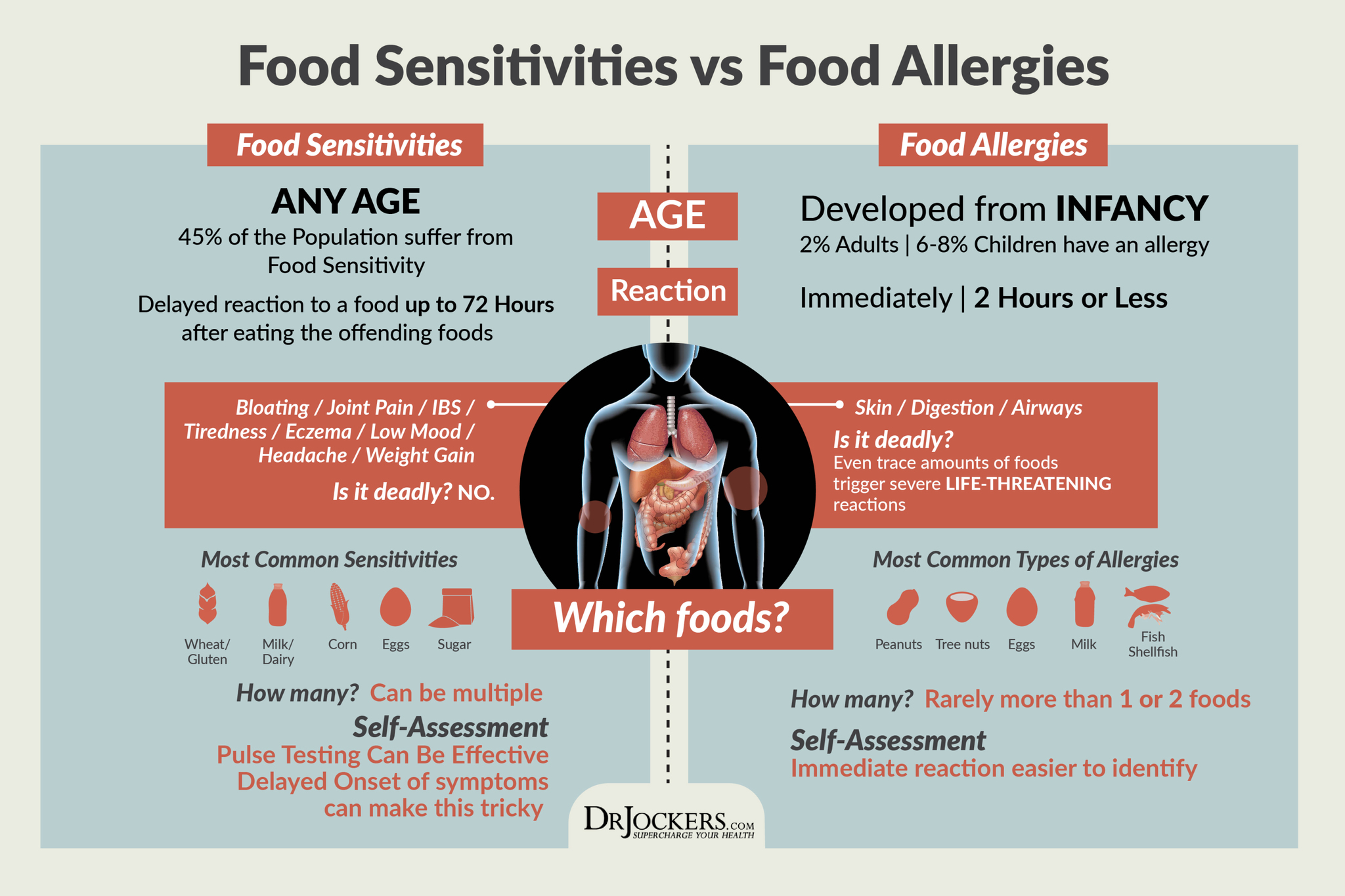
Eating Too Large a Meal or Eating Too Often
The cause of your abdominal bloating may not be what you are eating but how and how much you are eating. Eating meals that are too large or eating too often is a common cause of abdominal bloating. If you are drinking carbonated drinks with your meals, it may lead to abdominal bloating as well.
Eating too fast increases the amount of air that gets into your system, so eating too fast, eating big bites, not chewing your food properly, or talking too much while eating may also lead to abdominal bloating.
H. Pylori Overgrowth
One of the main reasons behind abdominal bloating or bacterial imbalance or overgrowth of pathogens in your gut. Helicobacter pylori (H. pylori) overgrowth is one of these problems.
This corkscrew-shaped bacteria is one of the main reasons behind chronic gastritis and ulcers. It may also lead to abdominal bloating, stomach pain, nausea, and unhealthy stools (2).
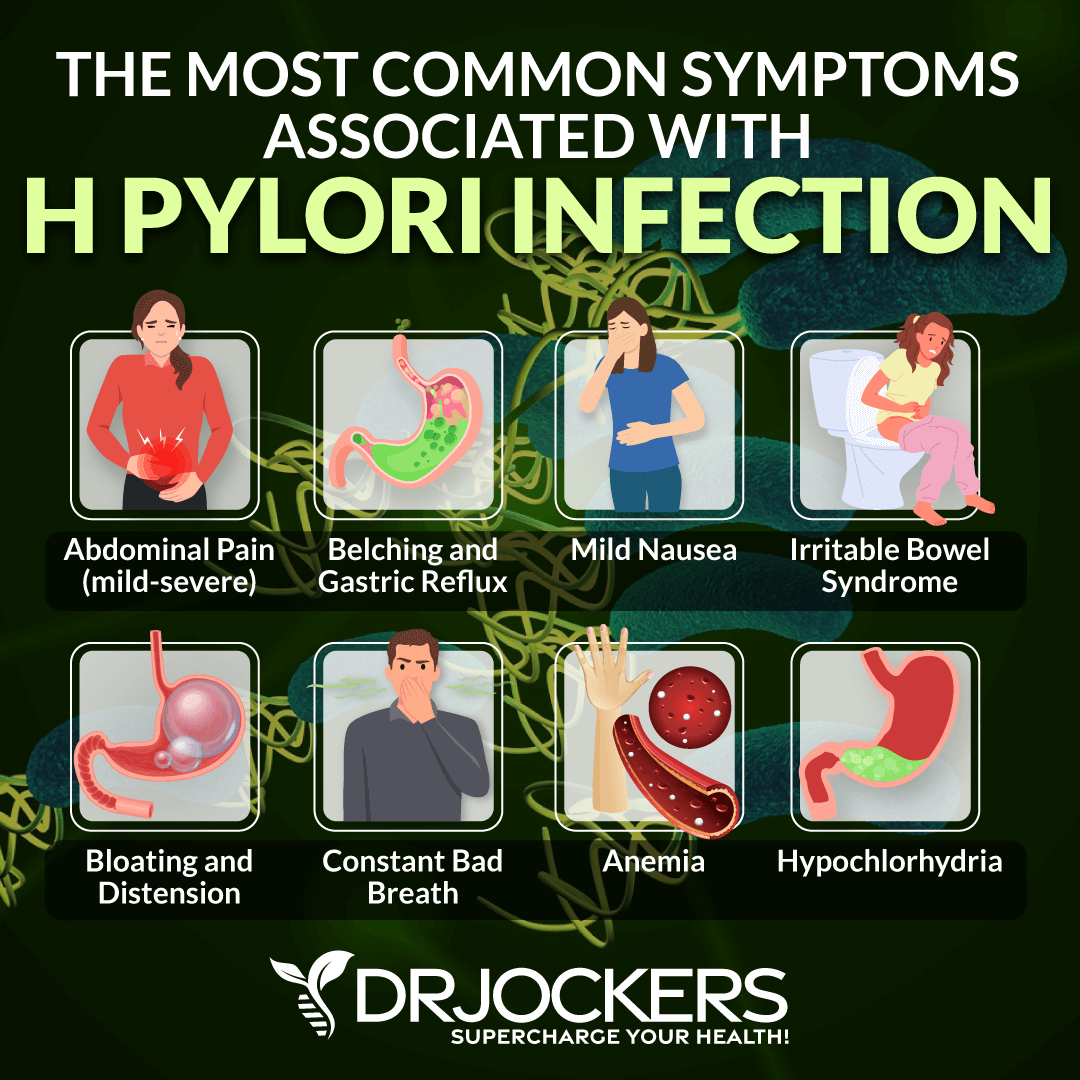
SIBO
Small intestinal overgrowth (SIBO) is a common gut health issue that may cause abdominal bloating. Under healthy circumstances, your small intestines don’t have too many bacteria. SIBO means that you have too many microorganisms in your small intestines that shouldn’t be there. SIBO can lead to abdominal bloating, poor digestion, cramping, gas, diarrhea, heartburn, food sensitivities, leaky gut syndrome, inflammation, and other health issues.
A common treatment for SIBO is the low-FODMAP diet. FODMAP stands for Fermentable, Oligo, Di-, and Monosaccharides, and Polyols, because higher FODMAP foods, such as beans, grains, cruciferous veggies, and many fruits tend to increase SIBO symptoms, including abdominal bloating. To learn more about SIBO, including symptoms, causes, testing, and solutions, I recommend this article (3, 4).
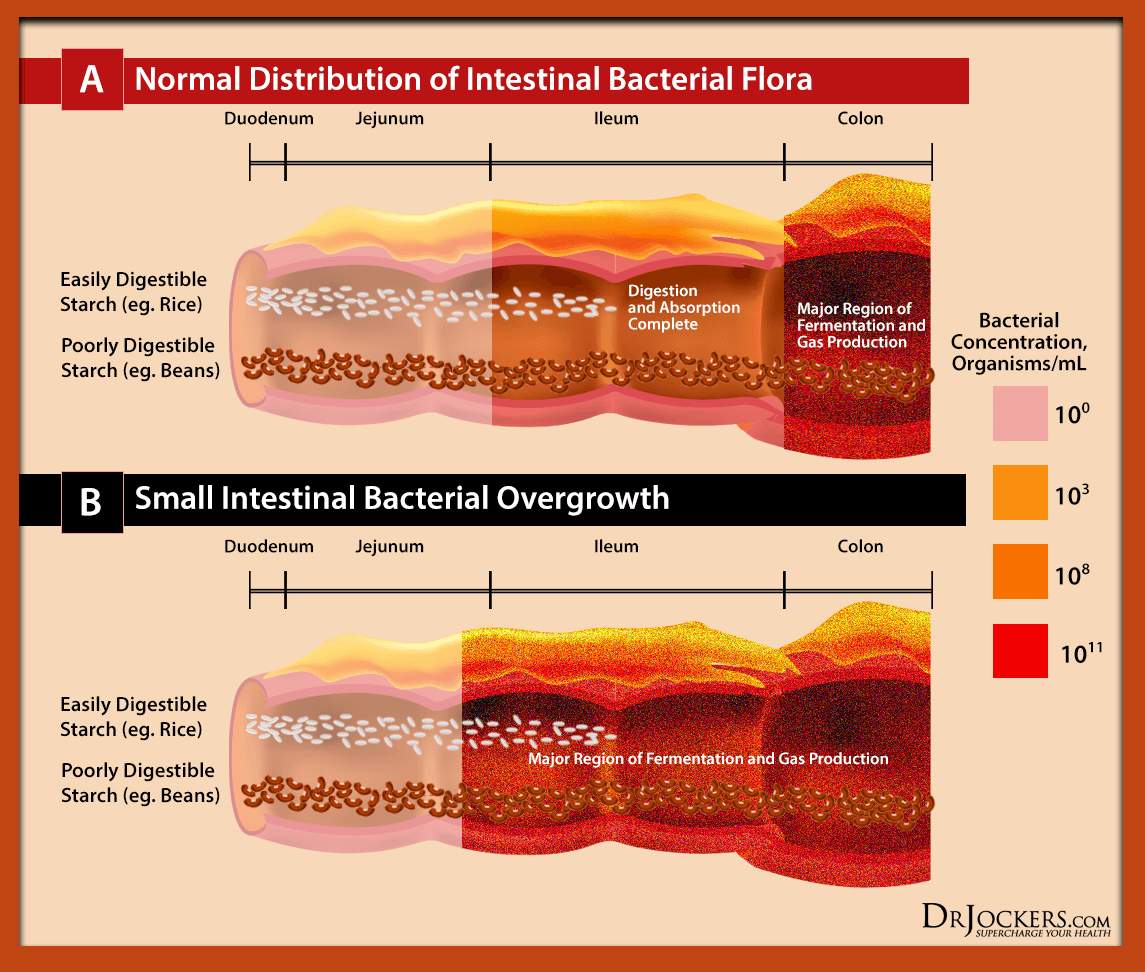
Parasite or Yeast Overgrowth
Yeast and parasite overgrowth can seriously disrupt your microbiome and digestive health. The most common fungal overgrowth you may experience is Candida overgrowth. Candida in a small amount is actually a beneficial yeast in your body, however, an overgrowth can lead to abdominal bloating, gas, indigestion, diarrhea, nausea, constipation, fatigue, headaches, skin infections, depression, anxiety, yeast infections, and other health issues.
Yeast overgrowth may happen due to too much sugar, an inflammatory diet, toxic overload, and other unhealthy lifestyle habits. Parasites are microorganisms that may enter your body through contaminated food or drinks. You may be surprised to learn that about half of the population suffers from parasite overgrowth leading to abdominal bloating, diarrhea, gas, constipation, digestive issues, fatigue, chronic pain, headaches, depression, and more.
Yeast and parasites will likely cause cravings for inflammatory foods that will further feed the overgrowth and create more abdominal bloating. To learn more about yeast overgrowth, I recommend this and this article. To learn more about parasite overgrowth, read this article (5, 6, 7).
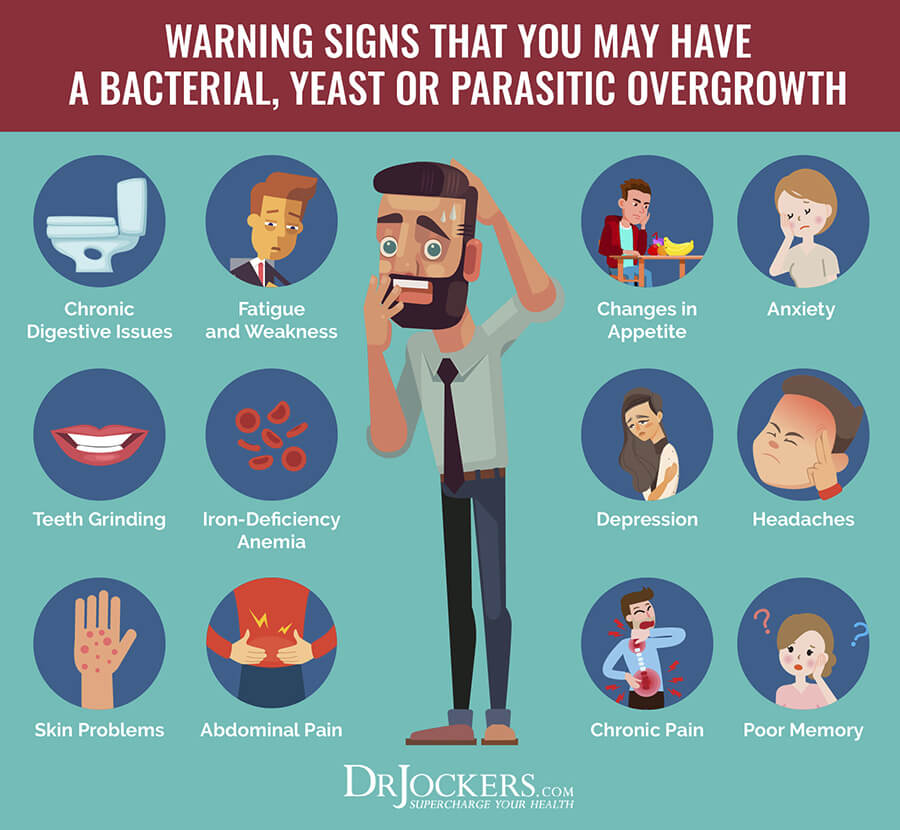
Low Stomach Acid
Hydrochloric acid or stomach acid is responsible for sterilizing any food that is about to move into your gut and break down protein. For healthy digestion, you need an optimal level of stomach acid. Low stomach acid may occur due to a poor diet, antibiotic use, H pylori infection, or stress. Low stomach acid may lead to abdominal bloating, gas, acid reflux, and digestive troubles.
It creates a vicious cycle of poor digestion, chronic gut inflammation, gut microbial overgrowth, low nutrient absorption, elevated stress hormones, and leaky gut syndrome. To learn more about poor stomach acid, I recommend this article (8).
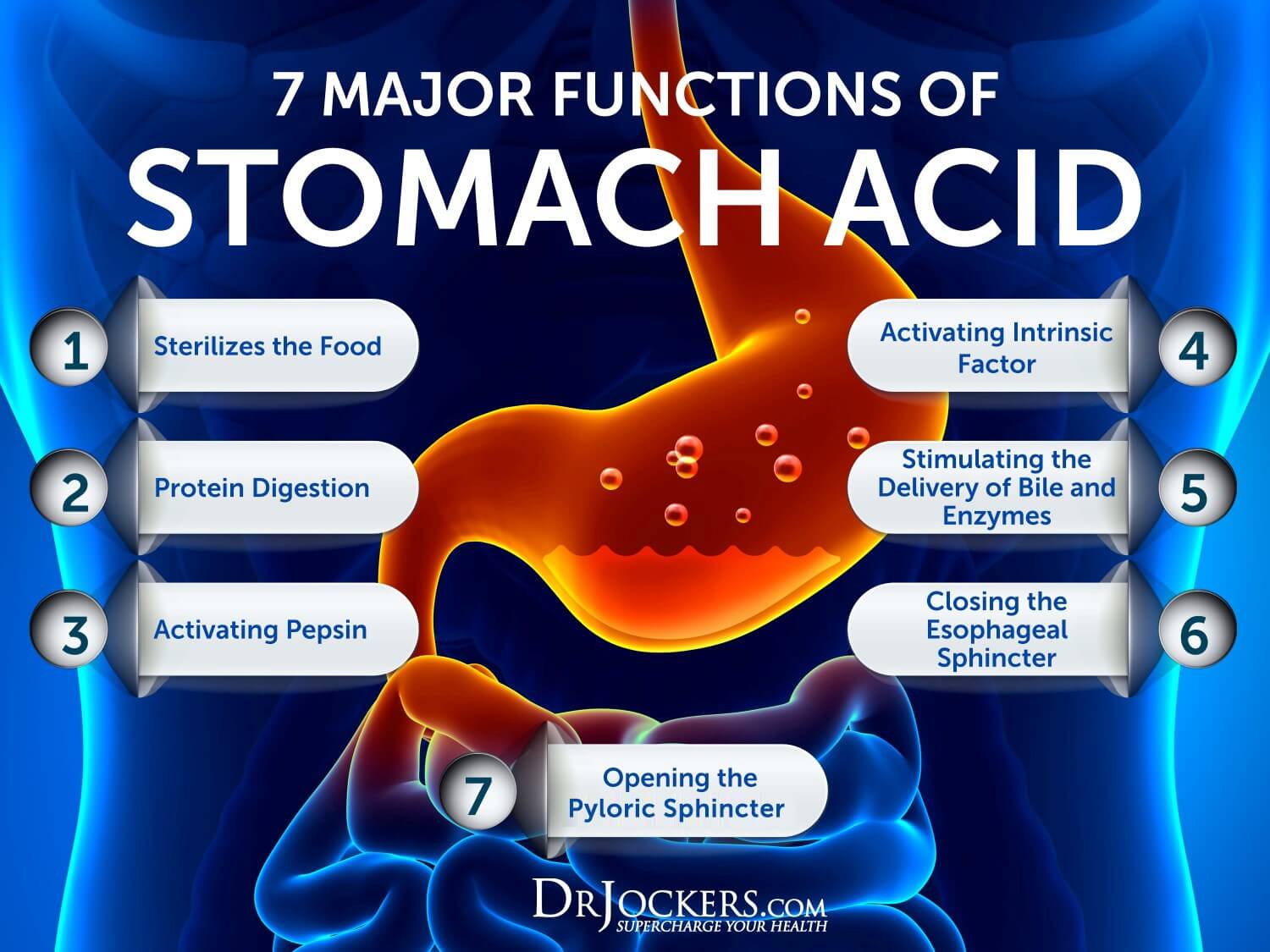
Poor Bile Flow
Bile is a greenish-brown liquid made up of cholesterol, bile salt, and bilirubin. It helps to emulsify fats for the breakdown and absorption in your small intestines. It also contains waste products to help pass through your intestine and release through bowel movements.
Poor bile flow can lead to blockages in the gallbladder, poor fat absorption, malnutrition, and an accumulation of toxins. It is also very important for sterilizing and regulating the microbiome in the small intestine and making sure we don’t develop a microbial overgrowth. Not surprisingly, poor bile flow can lead to bacterial overgrowth, abdominal bloating and other gut health symptoms. To learn more about bile flow, I recommend this article.
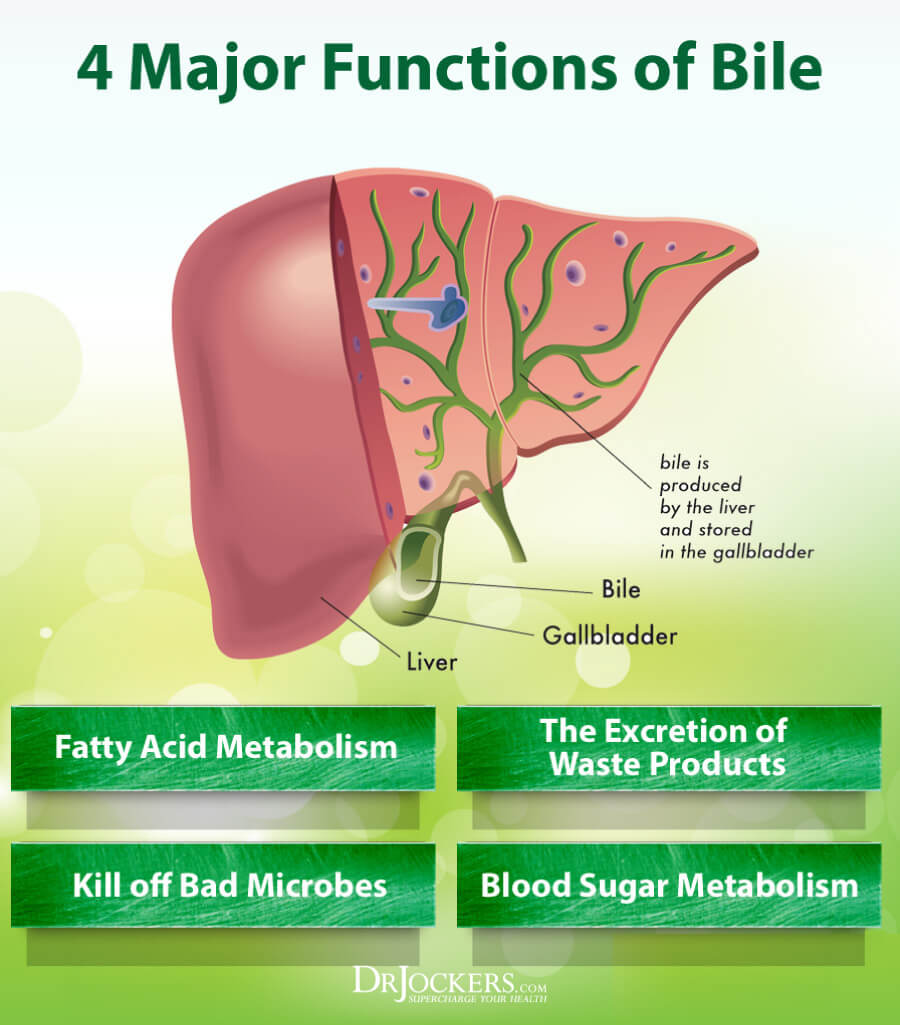
Functional Digestive Health Testing
Knowing the cause of your abdominal bloating is important for appropriate treatment and recovery. The good news is that you can try a few functional digestive health testing methods to figure out if you have any underlying issues, such as low stomach acid, SIBO or microbial overgrowth.
Just by looking at the symptoms and at home testing strategies you may already have a hunch on which issue is at the root cause. You can use the step by step testing, beginning with a specific food challenge and moving up to a supplement challenge or lab test to confirm.
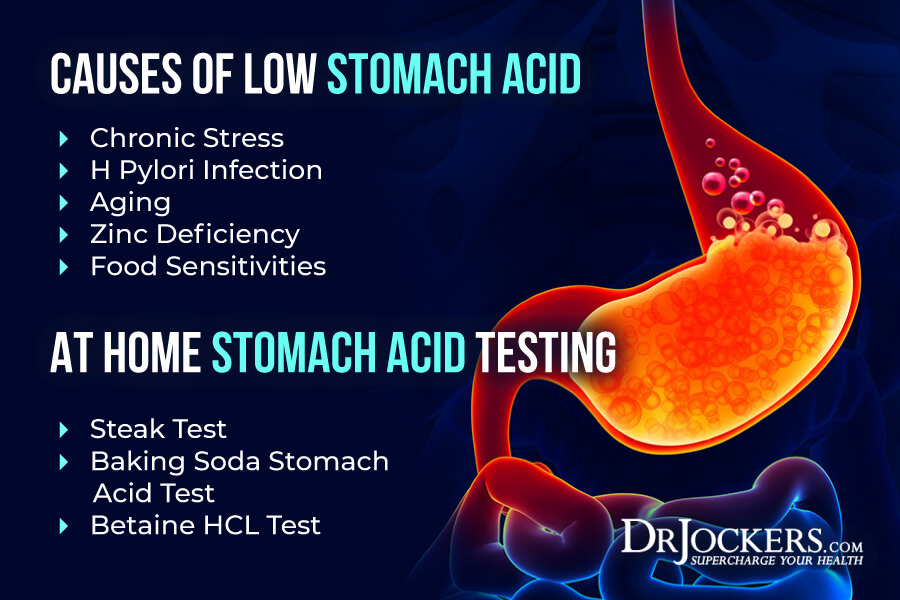
Stomach Acid Testing
Here is what I recommend for low stomach acid testing.
Steak Test
The first test I recommend is the steak test. Eat a steak all by itself. Check how you feel over the next 3 hours of finishing the steak. If you feel tired, have abdominal bloating, gas, acid reflux, nausea, or other symptoms, you may have low stomach acid. If you feel good, you likely have optimal stomach acid levels.
Baking Soda Stomach Acid Test
I also recommend the baking soda test. Mix ¼ tsp of baking soda with 4 to 6 oz of cold water. Drink this mix first thing in the morning before drinking or eating anything. Time how long it takes for you to burp or belch after drinking it. If it takes longer than 5 minutes, your body likely produces insufficient stomach acid.
If you burp or belch very early or several times, it may be due to too much stomach acid. Small burps may only be from swallowing air from drinking too quickly. If it takes you 3 minutes to belch, you may have low stomach acid levels. You may read more about this strategy here.
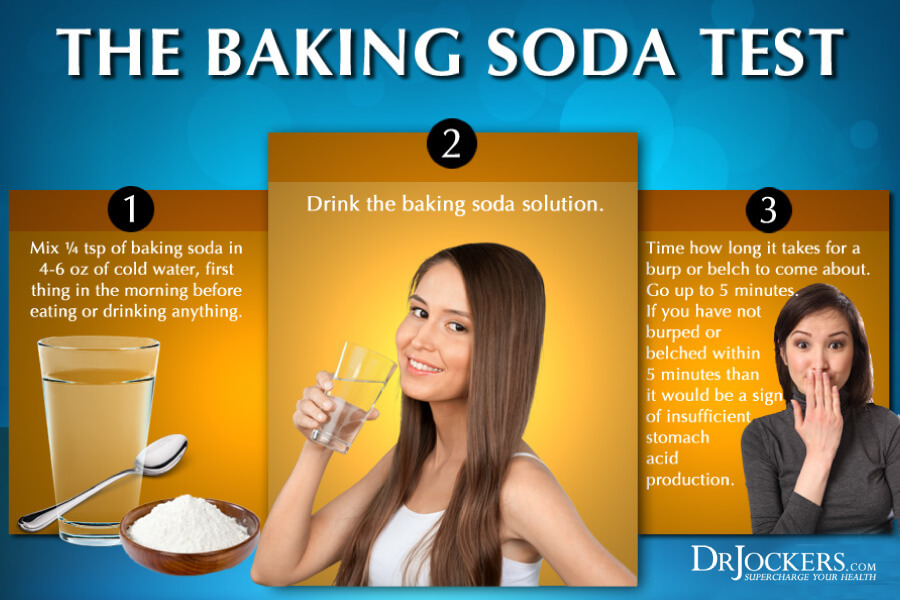
Betaine HCL Test
Another test you may try is the Betaine HCL test. Buy some Betaine HCL with pepsin, such as Acid Prozyme. Eat a high protein meal with at least 6 ounces of meat. You may also eat veggies with this meal. In the middle of the meal take your Betaine HCL pill, then watch your symptoms after your meal.
If you don’t feel a difference, you may have low stomach acid levels. If you notice indigestion, burning, heaviness in your chest, or feeling hot, you may have adequate stomach acid levels. If you don’t consume enough protein, take the capsule too early before the meal, or have an esophageal sphincter dysfunction, you may get a false positive. To avoid false positives, I recommend that you try this test 2 or 3 times to make sure you have a true positive for each test. If you get 3 positives, check out this article for tips on how to improve your stomach acid.
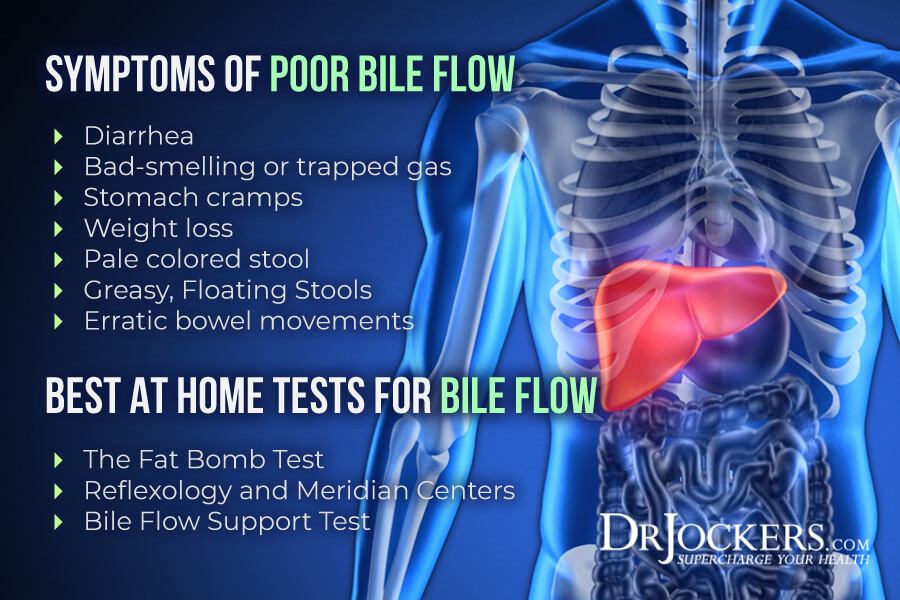
Bile Flow Testing
Here is what I recommend for testing for poor bile flow.
The Fat Bomb Test
A simple test I recommend for poor bile flow is the fat bomb test. Eat 2 to 3 of these chocolate fat bombs. Monitor how you feel over the next 3 hours. If you feel tired, have abdominal bloating, cramping, pain acid reflux, nausea, gas, diarrhea, floating stool, or other digestive complaints, you may have poor bile flow.
Reflexology and Meridian Centers
Another great tool for bile flow testing is reflexology and your Meridian centers. Chinese medicine has your body mapped out into a specific zone called Meridians to help healing through reflexology, acupressure, and acupuncture. Pain in any Meridian or trigger point may mean that the energy is stuck and not flowing due to a health issue.
Your gallbladder points include the web between your right thumb and forefinger, between your shoulder blades, across your Iliotibial band running from your buttocks to your foot into your 4th toe. If you are experiencing pain or cramping in these areas, especially between 11 pm and 1 am when your gallbladder is the most active or between 1 am and 3 am when your liver is the most active, may mean that your have poor bile flow or poor gallbladder and/or liver function.
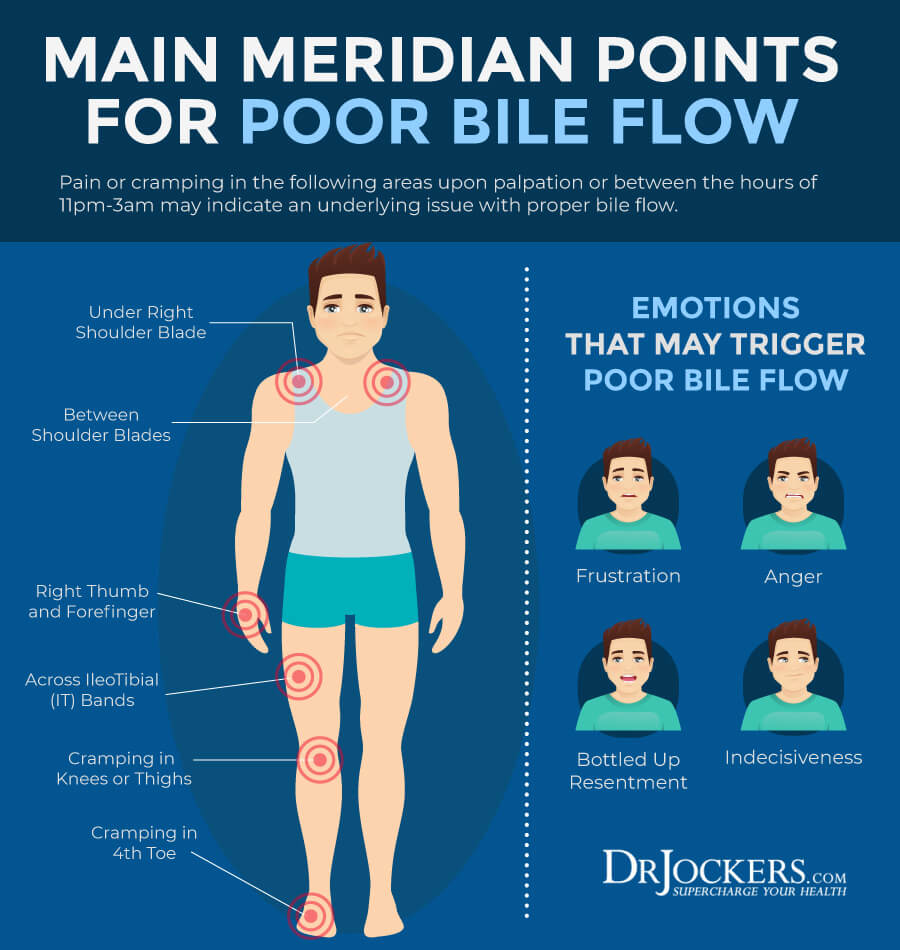
Bile Flow Support Test
Another simple test for bile flow is the bile flow support test. Take 2 capsules of the Bile Flow Support supplement after meals that are higher in fat.
Check-in with yourself to see how you feel better after meals. If you feel better and have improved stools, you may have poor bile flow.
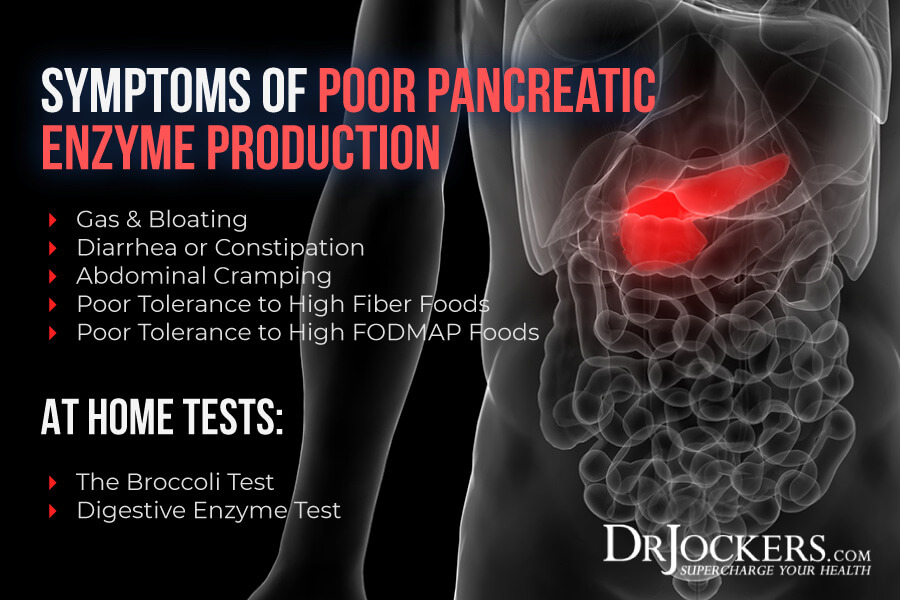
SIBO Testing
Signs of poor pancreatic enzyme secretion are typically associated with SIBO. Symptoms may include gas, bloating, distension, brain fog, gut pain, acid reflux, burping, diarrhea and constipation. These are the home tests that I recommend to check for pancreatic enzyme secretion and SIBO.
The Broccoli Test
One simple and delicious test I recommend is the broccoli test. Eat a big bowl of steamed broccoli. Monitor how you feel over the next 3 hours. If you have abdominal bloating, gas, cramping, acid reflux, or other digestive symptoms, it means that you may be experiencing signs of bacterial overgrowth and poor pancreatic enzyme function.
Digestive Enzyme Test
Another simple home test I recommend is the digestive enzyme test. Take 2 to 4 digestive enzymes, such as Super D-Zyme with your meals and see if you feel better. If you feel better you may have poor pancreatic enzyme secretion.
Comprehensive Testing for Digestive Health
Home tests are simple and great. They can help you to spot some digestive health problems without seeing a professional. However, if you have abdominal bloating and other digestive health troubles, further testing may be beneficial.
Comprehensive Blood Testing for Digestive Health
I recommend comprehensive blood testing to understand your digestive health problems, figure out the underlying issues causing your abdominal bloating and other symptoms, and finding appropriate solutions to support your health.
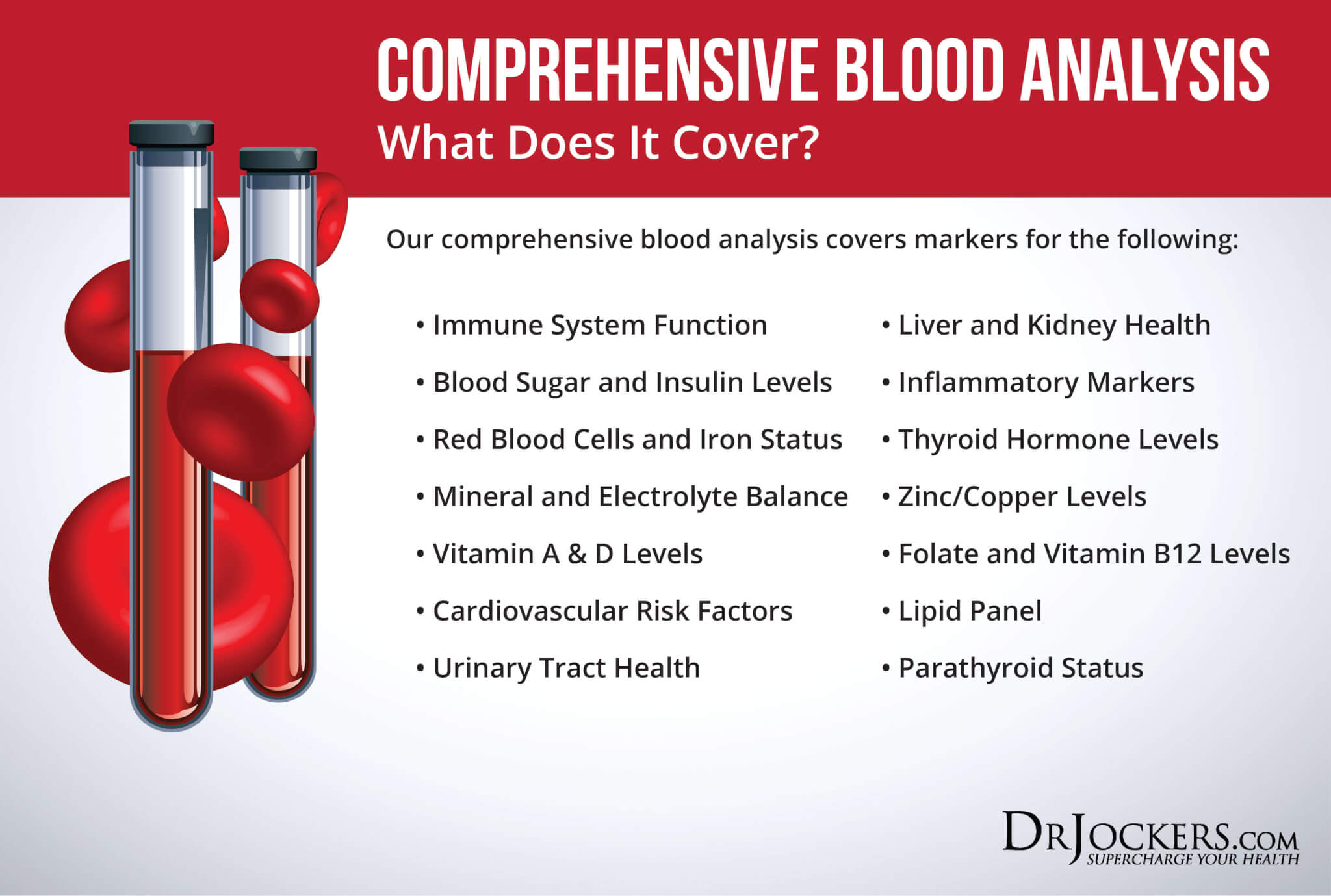
GI MAP Stool Test
I also recommend a GI Map Stool Test to gain a greater understanding of your digestive health and help appropriate lifestyle changes for improved digestive health.
To learn more about functional digestive health testing, I recommend this article.
SIBO Breath Testing
While the GI MAP is great for looking at overall pathogen load in the body, it will not give us insight on the bacterial load in the small intestine. When we have too much bacteria in the small intestine, they ferment food we consume too quickly and can cause gas and bloating.
The diagnostic test for small intestinal bacterial overgrowth (SIBO) is through a breath test you can find here. You simply drink a sugar solution and breath into a device several times over a period of 3 hours and send in the test kit.
Natural Bloating Solutions
If you are experiencing abdominal bloating, you don’t have to suffer anymore. Here are my natural bloating solutions to improve your health.
Gut-Friendly Nutrition Strategies
It’s not surprising that using gut-friendly nutrition strategies is the most important step to address abdominal bloating. Here is what I recommend: Begin with an elimination diet where you eliminate the most common food sensitivities such as gluten, refined sugar, vegetable oils, and dairy (other than butter) from your diet. Most people notice improvements within 2 weeks on an elimination diet.
If you don’t notice any improvements within 2-4 weeks then consider the results of the at home tests. If you do well on the steak test but not on the broccoli test then it would be wise to follow the low-FODMAP or carnivore diet. If you did poorly on the steak test but did well with the broccoli test, then I would try the prebiotic rich diet.
You will probably know within 2 weeks if the prebiotic rich diet is helping or hurting. If you don’t see improvements within a week or two then try the low-FODMAP or even the carnivore diet (unless you did poorly on the steak test) and see if that improves things for you. Again you should notice improvements within 2 weeks.
If you still aren’t getting improvements then you can try the elemental or semi-elemental diet and support your digestive system the way I explain further in the article. At this point, it would be wise to work with a functional health coach to help you optimize your digestive health plan.
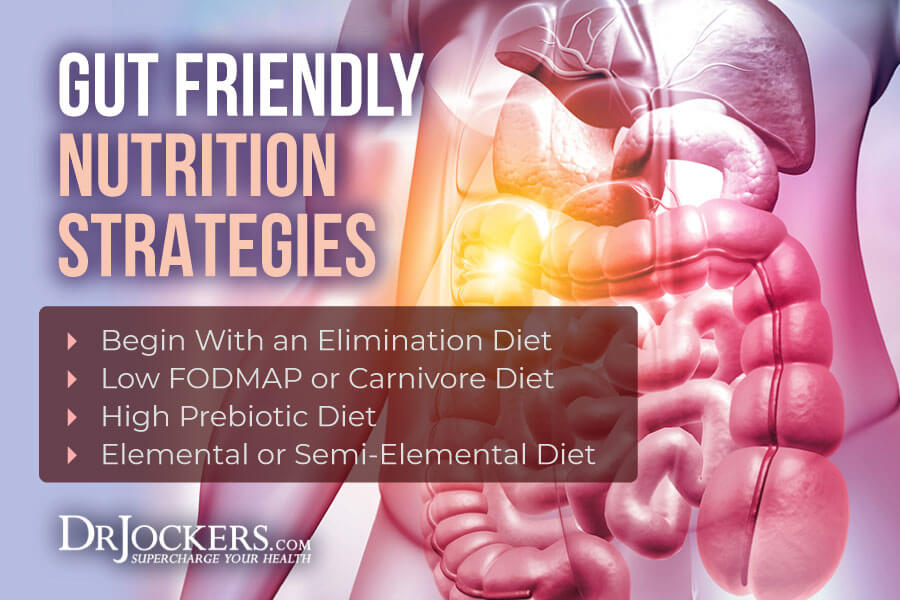
Try an Elimination Diet
Trying an elimination diet is the best strategy to figure out what your food sensitivities are and to notice what foods may cause abdominal bloating. To start, take out the following food groups from your diet for 2 weeks: gluten, dairy, refined sugar, corn, soy, eggs, all grains, vegetable oils, shellfish, tree nuts, legumes, and nightshade vegetables.
After a two-week elimination phase, introduce foods to your diet one by one. Eat a new food for two to three days. Notice your symptoms. If you have symptoms, remove them. Add a new food, note your symptoms, and continue. Generally, I recommend that you remove highly inflammatory foods, such as gluten, refined sugar, vegetable oils, and dairy from your diet for good. To learn more about how to do an elimination diet, I recommend this article.
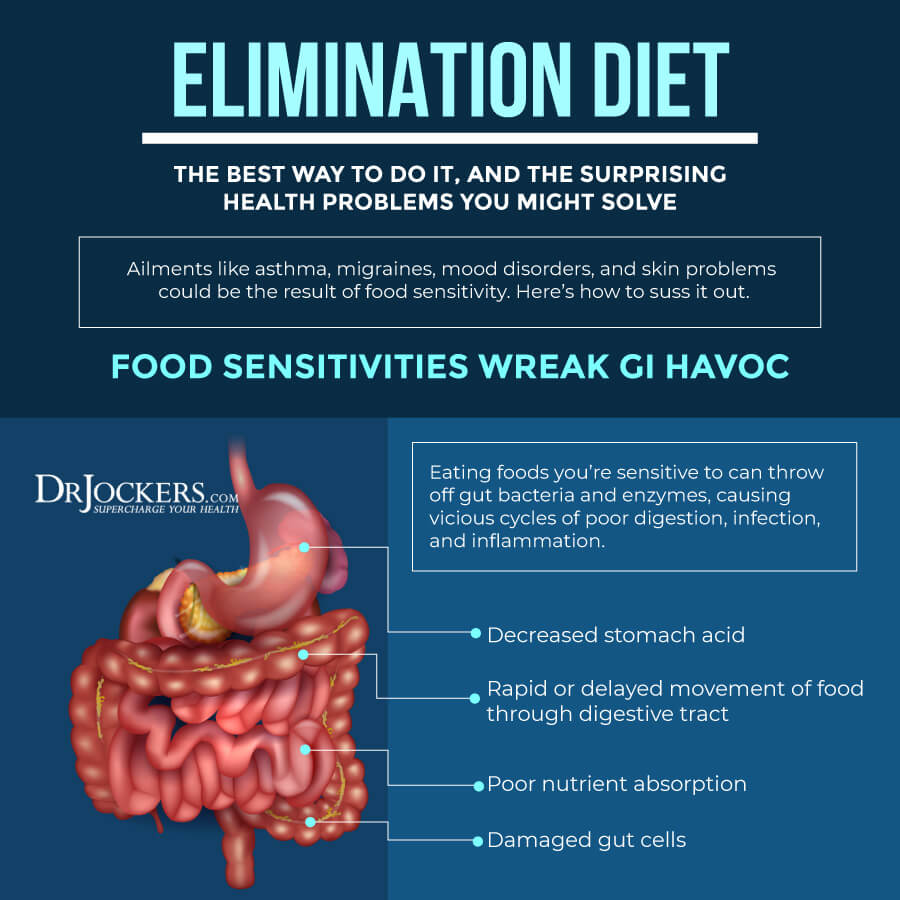
Try a Prebiotic-Rich Diet
Prebiotics can be important for good digestion. They are a specific dietary fiber that feeds the good bacteria, or probiotics in your gut.
That’s right, probiotics are not enough, you have to feed and support them with prebiotics. Prebiotic-rich foods include Jerusalem artichokes, leek, onion, garlic, asparagus, broccoli, cauliflower, dandelion, chicory greens, jicama, berries, apples, and bananas.
I have found that some individuals need more prebiotic foods in their diet while others need less and some may want to eliminate them all together for a short period of time to get their digestive system back in balance.
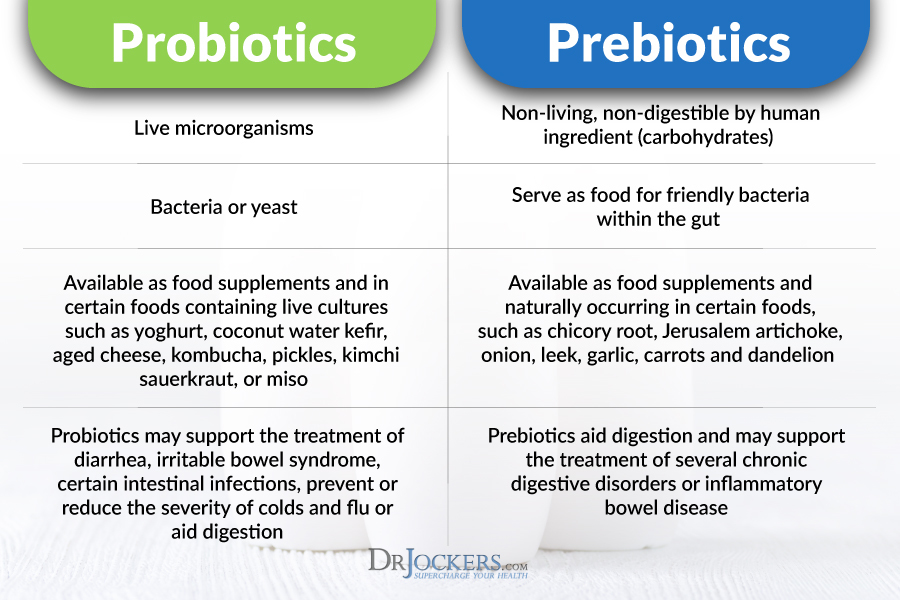
Try a Low-FODMAP Diet or Carnivore Diet
If you don’t do well with the prebiotic rich diet then I recommend trying a low-FODMAP diet. The low-FODMAP diet is generally recommended for people with SIBO, as well as those with another digestion discomfort.
Low-FODMAP vegetables include carrots, green beans, arugula, mint, basil, pepper, olive, pumpkin, tomato, potatoes, sweet potatoes, cucumber, zucchini, Swiss chards, lettuce, radishes, parsnip, sprouts, kale, and collard greens.
Low-FODMAP fruits include lemon, lime, kiwi, grapes, papayas, strawberries, raspberries, blueberries, melon, pineapples, and tangerines. Other low-FODMAP foods include egg, meats, fish, brazil nuts, chestnuts, butter, bone broth, seafood, quinoa, millet, rice, walnuts, and pinenuts. To learn more about the low-FODMAP diet, I recommend this article.
Another version of a low-FODMAP diet is a carnivore diet where you avoid all forms of fiber and only eat animal products such as beef, fish, poultry and butter. Many people all around the world have had success eliminating bloating and other health problems from doing a short term carnivore diet.
I recommend trying it for 2-4 weeks and seeing if you notice improvement. I don’t recommend following this for more than 3 months at a time but it can be something you do on a seasonal basis if you feel better with it.
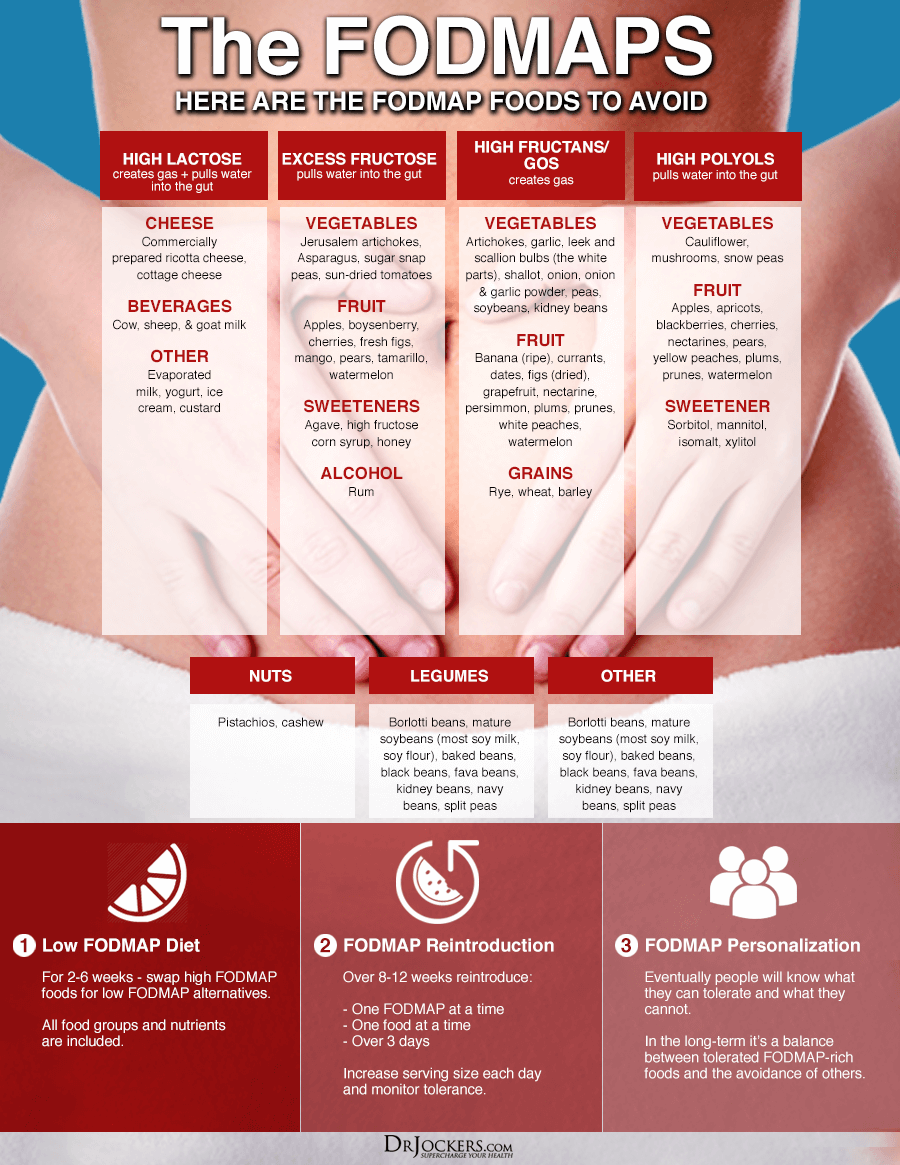
Try a Semi-Elemental or Elemental Diet
If you are not seeing any changes with the elimination diet, prebiotic diet or the low-FODMAP diet you may consider doing an elemental diet. This is a liquid diet using nutritional formulas with pre-digested foods. These powders include vitamins, minerals, and complete macronutrients, and are used to replace all or some of your meals. You can also do it with something like bone broth.
A true elemental diet is a liquid based diet only and it is usually for a short duration that could last anywhere from 3 days – 3 weeks. It is not encouraged to do it any longer than 3 weeks. At that point, you can switch to a semi-elemental diet. This is where you have 1-3 liquid meals such as smoothies, bone broth or an actual elemental diet formula and also 1-3 solid food meals on a daily basis.
The elemental diet or a semi-elemental diet is used for SIBO, Crohn’s disease, and eosinophilic esophagitis. I only recommend this diet short term and with the guidance of your healthcare professional until you resolve SIBO (9). I discuss liquid nutrition and elemental diet in more detail in this article.
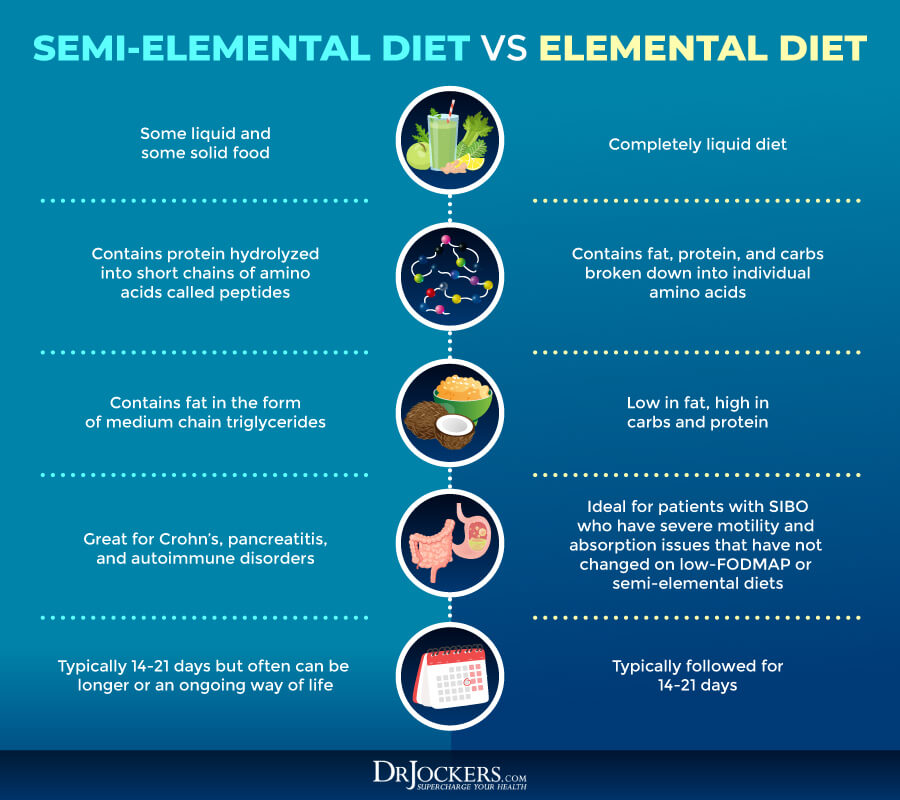
Improve Vagus Nerve Function
Your vagus nerve is one of the most important nerves that extend from your brain stem through your neck into your chest and abdomen and connects your brain and gut. It is responsible for regulating your digestion, heart rate, blood pressure, breathing, and emotional state. Improving your vagus nerve function is critical for improving your digestion and reducing abdominal bloating.
To improve your vagus nerve function, I recommend that you reduce your stress levels, improve your sleep, increase laughter and gratitude, practice breathwork, meditate, pray, connect with others, stimulate your palatal muscles by singing, chewing, or gargling, using cold water therapy, eating an anti-inflammatory nutrient plan, practicing intermittent fasting, moving your body, trying movement therapies. I also recommend taking Brain Calm Magnesium, and Cortisol Defense. To learn more about your vagus nerve, I recommend this article (10, 11).
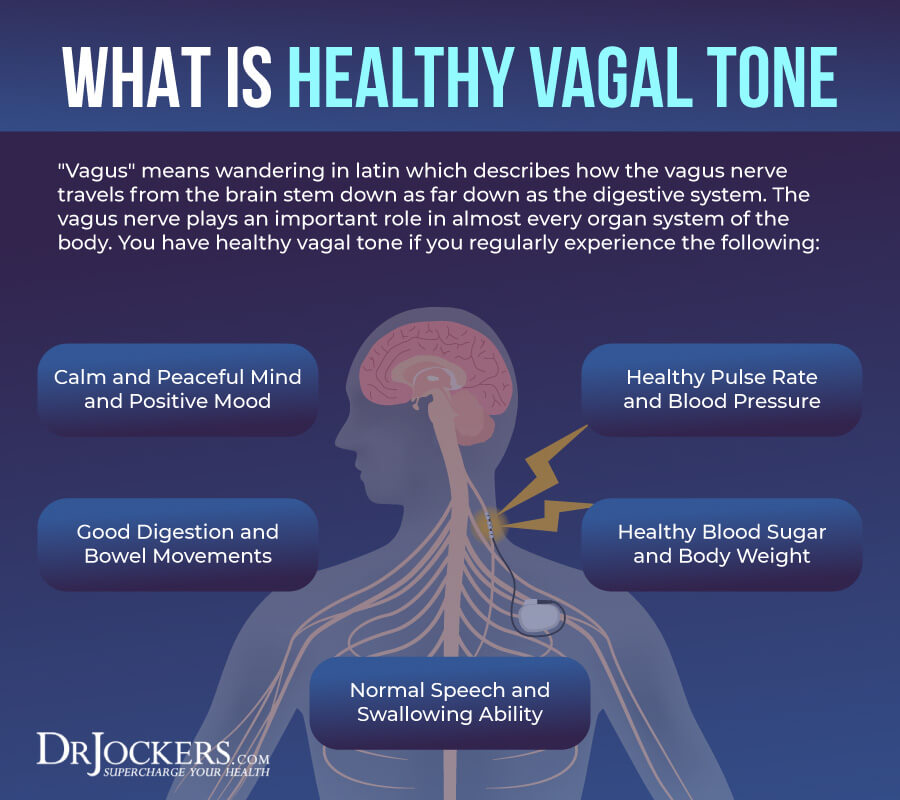
Improve Bowel Motility
Improving bowel motility is critical for improving your digestion and reducing abdominal bloating. Proper hydration and electrolyte balance is critical to achieving healthy bowel motility. I recommend that you start out your day with 32 oz of water and drink regularly throughout the day. Remember, feeling thirsty means that you are already dehydrated.
You can prevent this by drinking regularly. For electrolyte balance, you may add a pinch of salt to your water and eat mineral-rich vegetables. While prebiotics and fiber are critical for your health, not everyone’s body deals with it well. For some people, fiber and prebiotics are very helpful for bowel motility. Others have to be more careful, as too much can cause diarrhea or constipation. Experiment to find what works best for you.
Taking magnesium is another great way to support bowel motility and smooth bowel movements. I also recommend Oxy Powder. It is a magnesium and oxygen-based colon cleanser. It improves bowel motility, prevents and relieves constipation, improves your microbiome balance, and removes toxins from your colon.
For best results, take it 2 hours away from any food or supplements. Average servings may vary between 4 and 10 supplements to produce 3 to 5 bowel movements a day for successful colon cleansing. Lastly, support good vagal nerve activity with the strategies we discussed earlier for better digestion, bowel motility, and abdominal bloating prevention.
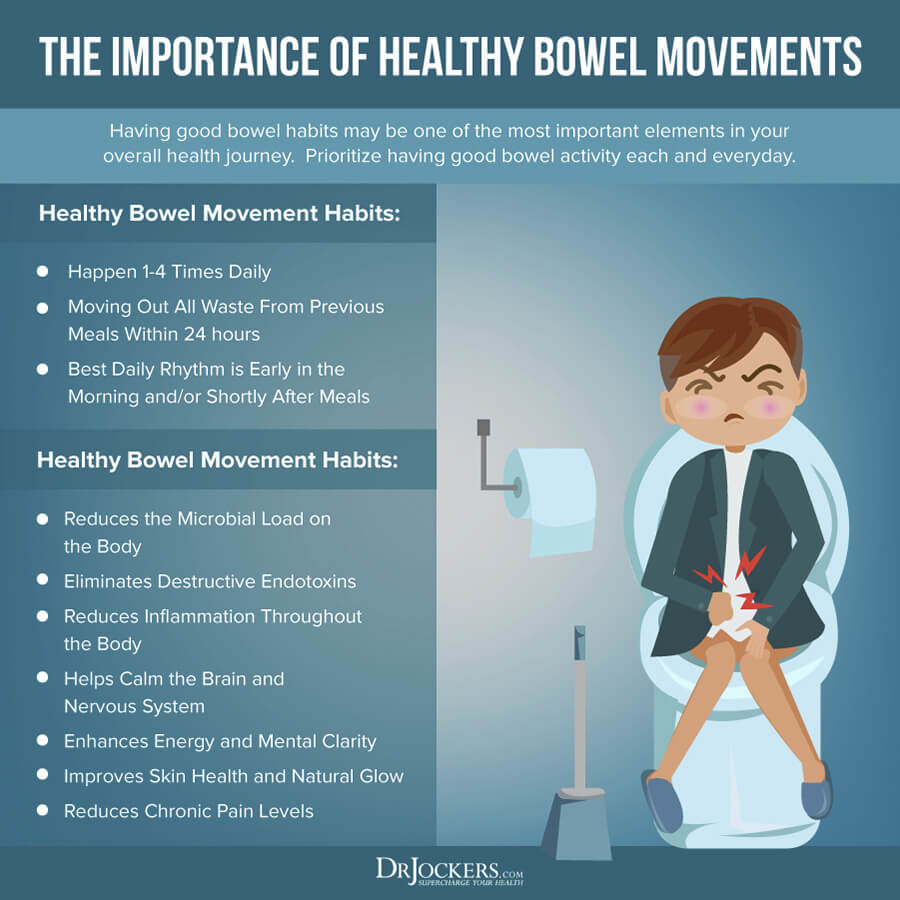
Try the Ileocecal Valve Massage
Your ileocecal valve connects your large and small intestines. It plays as a barrier and prevents the backflow of toxins. Ileocecal valve massage is a simple, effective, yet often ignored support strategy for abdominal bloating and other digestion troubles, including gas, cramping, constipation, and diarrhea. It is a fantastic strategy for those with SIBO.
Follow these steps to practice ileocecal valve massage:
- Place your right thumb on your hip bone and your left thumb on your navel.
- The valve is located about halfway between the hip bone and the belly button. Imagine a line that connects these two points and find the middle.
- Take all of your fingers and place them about 3 inches below that middle point. You should be very near the ileocecal valve.
- Press in slowly but deeply and firmly. Search for the little tender hardened area. When you found it, you’ve found your valve. It may be easier to find it while laying down.
- Massage this spot in a circular motion with medium pressure for 10-15 seconds.
- Then come about 3 to 4 inches to the left of the IC valve and make a fist and gently push from left to right to move contents through the small intestine and into the large intestine.
- After the massage, form your hand into a fist and stimulate the reflex located in the right front upper arm (close to your armpit) for 10 seconds.
To learn more about ileocecal valve massage, I recommend this article (12, 13).
Intermittent Fasting
Intermittent fasting is a type of fasting cycle between not eating (fasting) and eating (feasting) over a period of time. Intermittent fasting helps to improve your microbiome diversity, support your good flora, and improves the migrating motor complex.
It also allows cellular repair, increased autophagy, immune regulation, decreased, inflammation levels, lower inflammation, better insulin sensitivity. Intermittent fasting may also help to reduce your risk of chronic diseases, including irritable bowel syndrome and colon cancer. To learn more about the benefits of intermittent fasting and best intermittent fasting strategies, I recommend this article (14, 15, 16, 17, 18, 19 20, 21, 22, 23, 24, 25, 26).
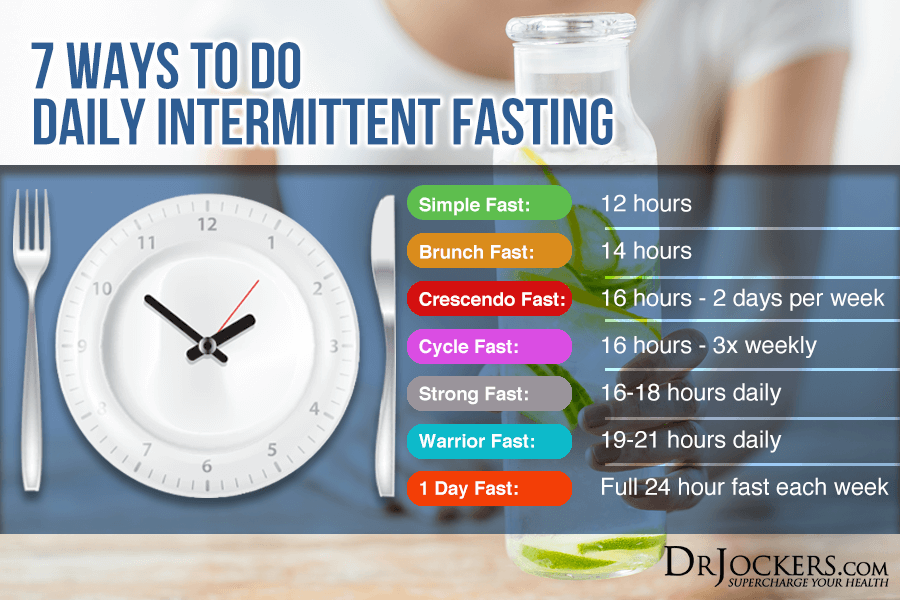
Test and Treat Gut Infections
Testing and treating gut infections is critical for recovery if you have abdominal bloating or other digestion symptoms. If you have tried the dietary strategies and digestive support strategies I have recommended and are not seeing results, it is a good indicator you are dealing with a gut infection.
This may be a bacterial, yeast or parasitic overgrowth or a combination of these. I recommend a GI Map Stool Test to understand your digestive health and help appropriate lifestyle changes and supplementation for improved digestive health.
For Candida overgrowth, I recommend the Candida Support Pack, for parasite overgrowth, the Parasite Support Pack, and for SIBO, the SIBO Support Pack.
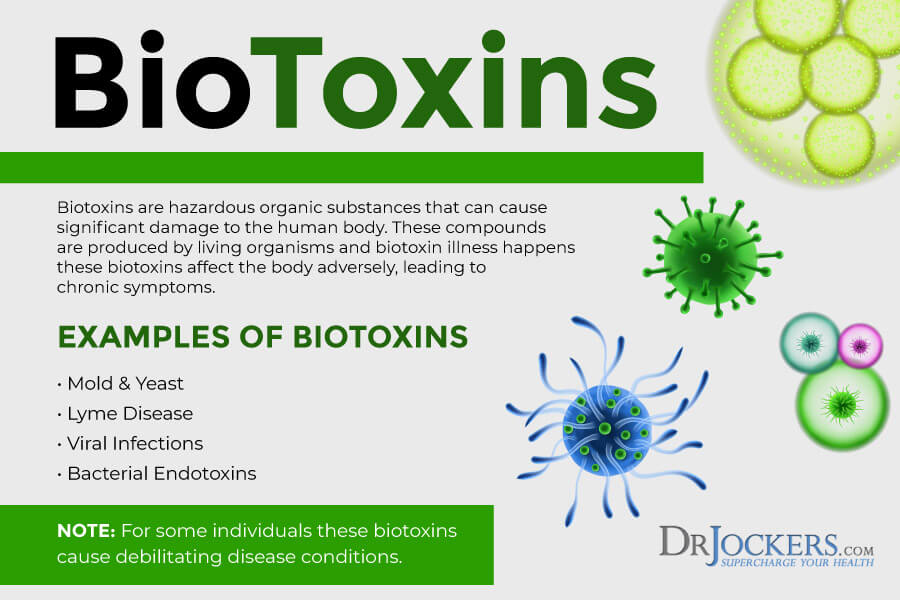
Support Stomach Acid and Bile Flow
Supporting your stomach acid and bile flow is critical for your gut health and the reduction of abdominal bloating. Some of the best strategies to apply include taking 1 tablespoon of apple cider vinegar in water about 10 mins before each meal and taking several deep breaths before eating to activate the vagus nerve and improve digestive juice production. I have list of strategies in the image below and a great article here on things to improve stomach acid production.
If you have done these things and are still suffering with symptoms associated with poor stomach acid and bile flow, consider taking Super Digest HCL. This supplement is made with betaine hydrochloride (HCl), an excellent source of hydrochloric acid, dipeptidyl peptidase IV (DPPIV), lactase, an enzyme that aids breakdown of lactose, “milk sugar”, and ox bile extract and lipase to emulsify and digest fats and fat-soluble vitamins. Take it regularly with your meals. Eating slowly and mindfully may also reduce symptoms of low stomach acid and aid digestion.
Ginger, turmeric, celery, dandelion greens, radishes, milk thistle, cilantro, mint, cucumber, parsley, lemon, artichokes, apple cider vinegar, green tea, and sauerkraut are some great examples of foods that support bile flow. I also recommend Bile Flow Support™, a liver support formula that supports your body with nutrients involved in bile flow and fat metabolism, including choline, taurine, and methionine. Take two capsules twice daily after meals for optimal benefits (27, 28, 29, 30, 31, 32, 33, 34, 35, 36, 37, 38, 39, 40, 41).
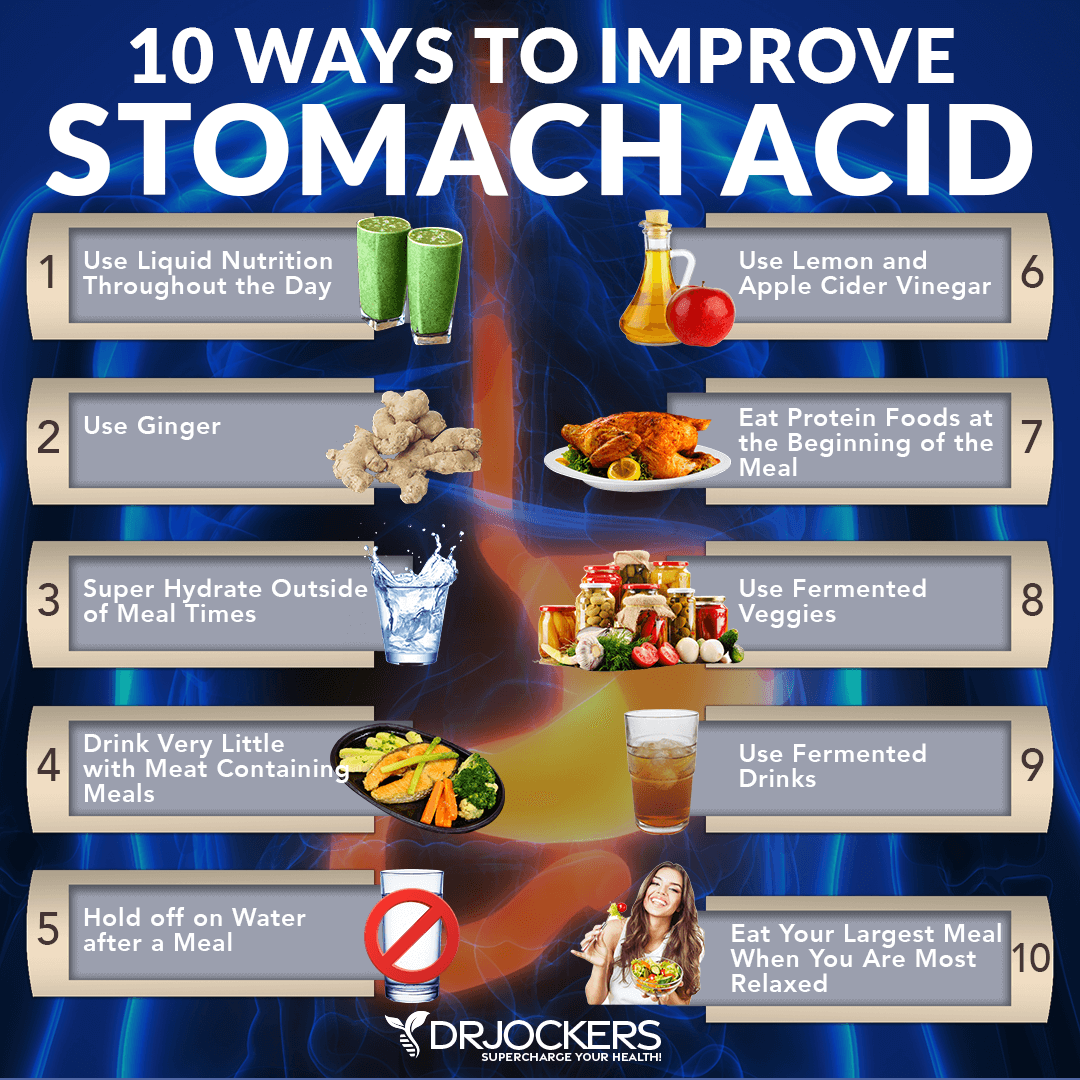
Use Probiotics
Probiotics are one of the most important things that you may consider to reduce abdominal bloating and improve your gut health. They are beneficial microorganisms in your gut. If there are too many bad bugs but too few beneficial bacteria in your gut, it leads to gut dysbiosis and gut health issues, including abdominal bloating.
Probiotics help to create gut flora balance and support gut health. Probiotic-rich foods include sauerkrauts, kimchi, kefir, kombucha, and yogurt. However, eating probiotic-rich foods is not enough to support your gut flora, especially if you are dealing with gut flora imbalance, abdominal bloating, and gut health issues. Taking probiotics is critical.
There are four types of probiotics you may use:
- Food-based probiotics, such as lactobacillus and bifidobacterium species (ProbioCharge)
- Probiotic yeast, such as saccharomyces boulardii (S-Biotic Flora)
- Soil-based (SBO) probiotics, bacillus spore forming strains (MegaSporeBiotic)
- Combination probiotics, lacto, bifido, S boulardii and bacillus strains (Nexabiotic)
Not everyone deals with each of these probiotics the same. Depending on your body and health issues, one works better than others. If you have SIBO, for example, soil-based probiotics are the safest choice as certain other probiotics may trigger your symptoms.
SBO probiotics is also a form that most people do well on, especially when starting out. Working with a functional health doctor, like myself, can help you determine which probiotics are the best for you. You may also try to use each type of probiotics for 7 days each and monitor your symptoms and experience to find what works best for you.
If you have multiple types of probiotics you respond well too, then I also recommend that you rotate your probiotic brands every 1 to 3 months cycling between different probiotics that work for you. This isn’t necessary but it can help your gut to adapt and diversify your gut flora. To learn more about different types of probiotics, I recommend this article (42, 43, 44).
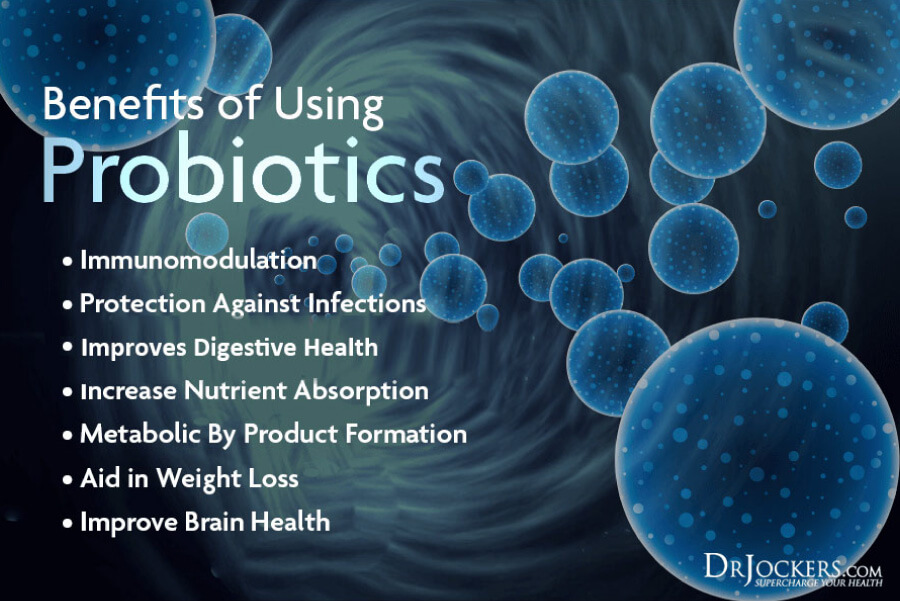
Use Carminative Herbs
To reduce abdominal bloating and improve your gut health, I recommend using some carminative herbs including:
- Fennel: Fennel enhances your natural enzyme activity in your small intestine and reduces any gut discomfort.
- Ginger: Ginger is an anti-inflammatory herb with gut-health benefits. It reduces indigestion, nausea, abdominal bloating, belching, and other gut discomforts.
- Dandelion: Dandelion tea is fantastic for abdominal cramping, upset stomach, indigestion, constipation, and diarrhea.
- Gentian: Gentian supports bile flow and offers relief for an upset stomach, abdominal bloating, and heartburn.
- Lemon Balm: Lemon balms supports your digestion and reduces abdominal bloating, gas, and indigestion.
Herbal Digest is a powerful supplement that includes all these carminative herbs to support your digestion and offer help for abdominal bloating, indigestion, and other gut health issues. Take it twice a day with meals for optimal support. To learn more about carminative herbs, I recommend this article (45).
Use a Castor Oil Pack For Immediate Relief
Castor oil is popularly known in folklore as a potent carthartic which stimulates the complete release of substances from the gastrointestinal tract and improves bowel motility. (3) Castor oil packs have the same therapeutic properties when applied to the skin following absorption. Applying castor oil packs to the abdominal region can help reduce gas and bloating and improve the quality of your bowel movements.
By far my favorite castor oil pack is from Queen of Thrones because Dr. Marisol is an expert in castor oil therapy and she has made it much easier to use by including the castor oil pack in with the organic castor oil in a glass jar. This is the one I use at home.
Use Activated Charcoal For Instant Relief
If you are looking for immediate relief, I recommend Activated Coconut Charcoal. It is one of the oldest detoxifying remedies that offer relief from abdominal bloating and gas, absorbs toxins to reduce digestion issues and brain fog, and rejuvenates your cells.
Take two or more capsules with food for the best results. To learn more about the benefits of activated charcoal, I recommend this article (46).
Final Thoughts
Abdominal bloating is a common problem millions of Americans experience on a regular basis characterized by a swollen, full, and tight abdomen after meals. Follow my natural bloating solutions to reduce abdominal bloating and improve your health and well-being.
If you want to work with a functional health coach, I recommend this article with tips on how to find a great coach. On our website, we offer long-distance functional health coaching programs. For further support with your health goals, just reach out—our fantastic coaches are here to support your journey.

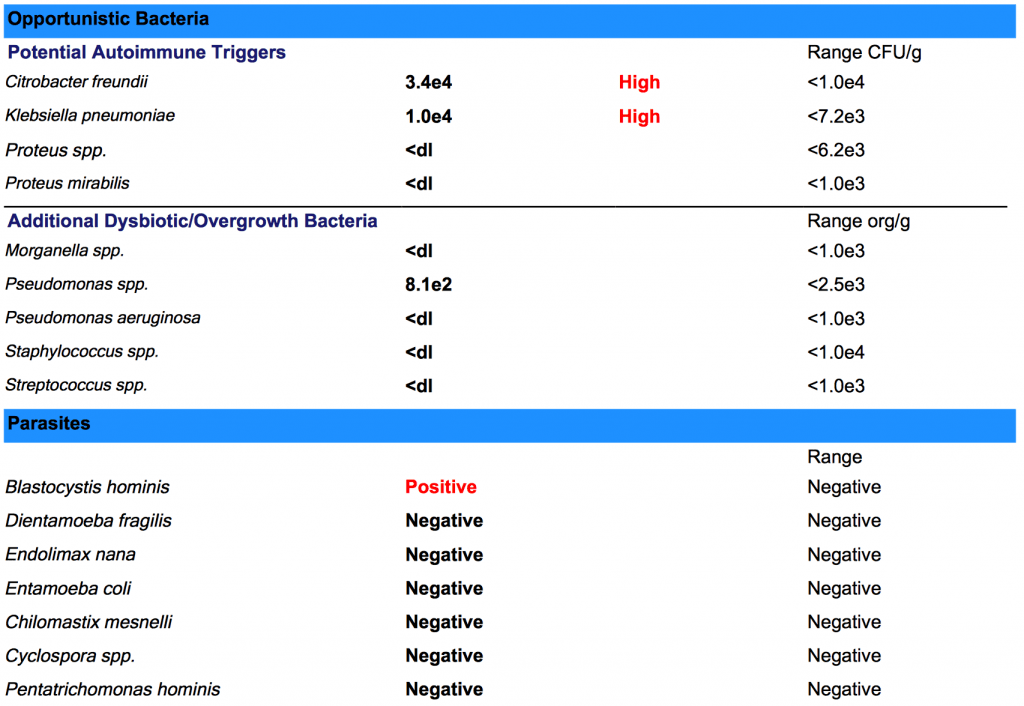





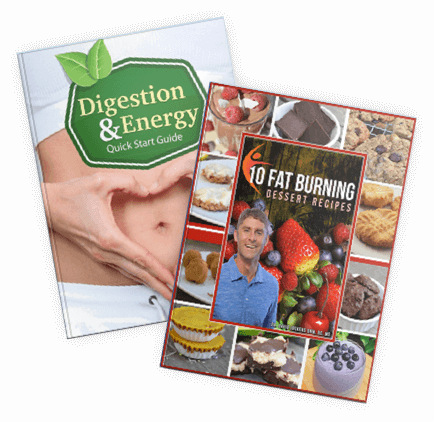

Thank you Dr Jockers, that was an excellent article and I will be sure to read some of the other links and also do some of the elimination tasks.
Great to hear this was helpful for you!
You seem to know just what I need, and I loved the article. Thank you so much!P
Great to hear that Peggy!
Hi Doc, what an amazing amount of information, thank you.
Even though I live very healthy, always have, now keto, I have digestive issues like gas and bloating. I will read your article again bc there is so much info to digest (pun intended). I will do that baking soda test as well as order the Herbal Digest. I do not consume most of the bad food, only weakness is plain yogurt and European cheese.
I look forward to future information. Be well, Elvire
Thanks Elvire and keep us updated on how you are responding! Blessings!
You have great educational health articles. but too long & too much articles…sorry no time to spend too long reading all these articles. but thanks so much.
Hello Lalita, yes our goal is to create the most indepth and thorough natural health articles on the web. Health conditions are complex and short blog posts only skim the surface, we try to give the whole picture. I would only spend your time reading the content that is of most interest to you.
I agree. Sounds like great material and possible solutions. But just an overload of
info. Too many possibilities and symptoms to determine what could be the problem.
May experience a couple of symptoms, but these could also be the cause of a totally
different issue. I guess this really takes much investigating and seemingly difficult to
accomplish without a health professional advice. But my experience with the pros has not solved problems. However, thanks for the thorough info.
Yes there are many different root cause factors that need to be ruled out or addressed. This is why it may be helpful to work with a functional health practitioner to help you get to the root cause.
Thank you for a very clear and comprehensive article. This is a complex subject and was extremely helpful for me. I’m saving it as a resource silo that I can work through the information and it your suggestions into action. All the best!